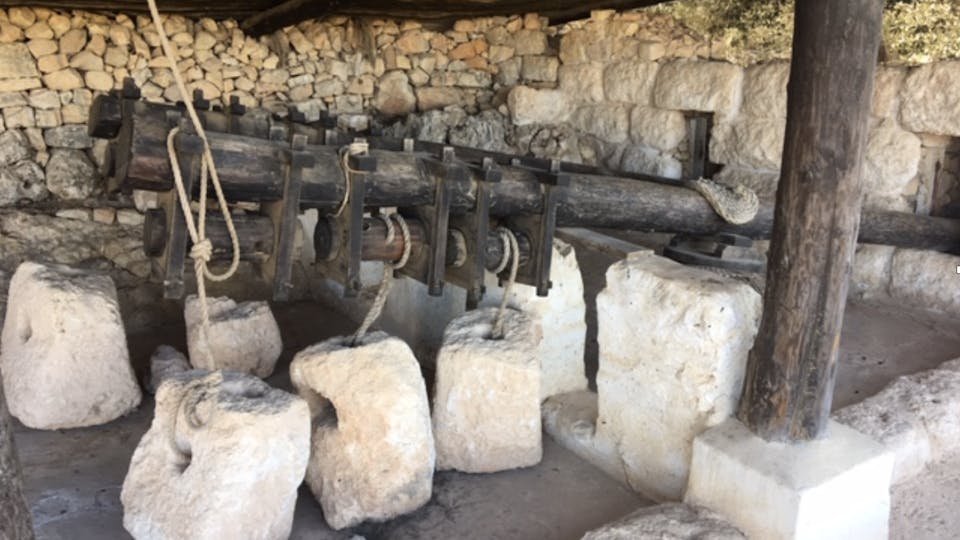Exploring the Biblical Significance of Oil in the Holy Land

Throughout the Bible oil holds deep spiritual meaning; symbolizing the anointing and the blessings God bestows upon His people. The biblical significance of oil is seen in its use for anointing kings, prophets, and priests, as well as in religious ceremonies, sacrifices, and healing.
From the consecration of sacred places to Jesus’ parables, oil plays a key role in conveying God's presence, favor, and abundance. As we explore oil’s profound symbolism and its use throughout the Holy Land, we gain a greater understanding of its spiritual impact on biblical history and its ongoing relevance today.
The Role of Oil in Biblical Times
All through the Bible, oil is a picture of the Holy Spirit of God and the special impact the Spirit brings upon a person, place, or article of worship God chooses. Oil became a central part of Temple services, worship celebrations, sacrifices, healings, and more. Oil signifies:
- Consecration
- Joy
- Abundance
- A sure sign of God’s favor and blessing

Oil’s First Appearance in the Bible
Oil’s first appearance in the Scriptures is found in the account of Jacob’s dream when he fled from his brother’s murderous wrath to find shelter with his uncle Laban. We read in Genesis 28 that when Jacob stopped to rest on his journey:
"... he dreamed, and behold, a ladder was set up on the earth, and its top reached to heaven; and there the angels of God were ascending and descending on it. And behold, the LORD stood above it and said: ‘I am the LORD God of Abraham your father and the God of Isaac; the land on which you lie I will give to you and your descendants.’"
Jacob’s act of pouring oil on the stone where he had the dream sealed the great promise and indicated his trust in God’s promises. The biblical significance of oil here is that it consecrated the stone and the promise given there for a Holy purpose.
Oil in Our Lives and the Parable of the Wise Virgins
Not only were kings and prophets anointed with oil in the Old Testament, but Jesus also used the metaphor of oil in His parable about the wise and foolish virgins in Matthew 25.
In this story, Jesus hints that the virgins’ supply of oil is a symbol of the presence of God’s Spirit in their lives and their faithfulness, further emphasizing the biblical significance of oil as a spiritual treasure.
The Olive Harvest in Israel
Throughout the land of Israel, olive orchards yield precious fruit ready for harvest in the fall. The olive harvesting process reflects ancient practices used for thousands of years:
- Shaking and beating the branches with rods
- Collecting the olives on canvases stretched under the trees
- Transferring the olives to olive presses
- Grinding the olives into olive paste using a millstone
At the press, the olive paste is spread on fiber disks and stacked for pressing. As pressure is applied, the liquids are separated through the ancient process of decantation. This method, still used today, produces high-quality olive oil for domestic use and export.

The Different Uses of Olive Oil
In Bible times, olive oil was evaluated by its level of purity, determined by the amount of pressure applied to the olive paste. The biblical significance of oil extends to its various uses, including:
- First harvest: Purest virgin oil used for priestly duties in Temple services
- Second harvest: Used for healing anointing
- Third harvest: Used for cooking
- Fourth harvest: Used for cleaning
The first fruits, the purest of all, were always appointed for the highest purpose, dedicated to the Lord.
Spiritual Lessons from the Olive Press
In a similar way, life’s pressures extract the precious oil of God’s Spirit in our hearts as we endure suffering and trials. Just as the olive press produces different levels of oil, the tests we endure bring forth the priceless fruits of patience, endurance, and faith.
This process mirrors the biblical significance of oil, symbolizing the refining of our souls through challenges.
Frequently Asked Questions:
1. What is the biblical significance of oil?
The biblical significance of oil represents the Holy Spirit, God's blessings, and consecration for holy purposes. Beyond culinary use, oil was used for anointing kings, prophets, and priests, symbolizing joy, abundance, and divine favor.
2. Why was oil important in biblical anointing ceremonies?
Oil was a symbol of God’s blessing and approval in biblical times. It was used to anoint individuals chosen by God, such as kings and priests, marking them as consecrated for a divine purpose.
3. How is olive oil produced in Israel today?
Olive oil in Israel is produced using both traditional and modern methods. The process includes harvesting olives, grinding them into a paste, and applying pressure to extract the oil.
Conclusion:
We look forward to hosting you in Israel, where you can see ancient olive presses and learn more about the biblical significance of oil and its historic and sacred uses.